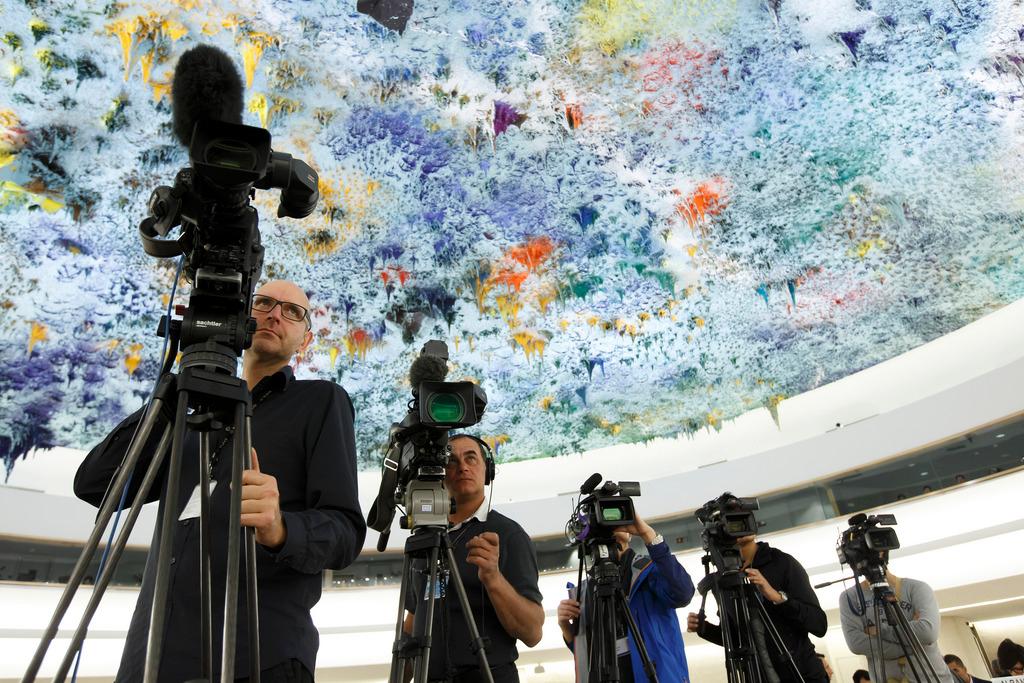In Geneva, human rights mixes with national rivalries
The newest incarnation of the United Nations’ top human rights body is marking its ten year anniversary, and while the 47-nation Human Rights Council is an improvement on its predecessor, that has not put an end to violations that recur across the globe including the most advanced democracies.
Since its creation in 2006 with strong backing from Swiss diplomacy, the UN Human Rights Council has made significant progress toward institutionalising mandatory human rights reviews of each of the UN’s 193 member nations – the latest addition being South Sudan in 2011.
Yet the Geneva-based Council also has not remained immune from the double standards and politicisation that plagued its predecessor.
The Council was created in March 2006 to replace the UN Commission on Human Rights, which was often criticised as easily manipulated by nations with poor human rights records. The United States was one of the few nations that voted against creating the Council, arguing that it also lacked safeguards against hypocrisy.
No binding authority
The Council, whose purpose is to address human rights violations, lacks any binding authority. Instead, what power it has derives from being a forum for airing grievances, and for naming and shaming. And while the legal architecture for enforcing human rights has strengthened in recent years, the situation on the ground has deteriorated, a paradox noted by Swiss Foreign Minister Didier Burkhalter in a speech to mark the Council’s anniversary.
“Have we made progress in respect for human rights? The real answer can be read in the eyes of children who are ten years old,” said Burkhalter.
“For many children, it is still far away in 2016,” he said. “Today, as we meet here in Geneva, in this city of peace, many crises are raging around the world. Our world is experiencing many difficulties in resolving these crises, which uproot millions of people and that give too many children nightmares, night and day.”
Amnesty International drove home much the same point ahead of the Council’s main annual session, which is being held this month. The group reported that many governments had brazenly broken international law in 2015, including 19 nations where war crimes or other such violations were being committed; 122 nations that resorted to torture; and 30 or more that illegally forced refugees to return home where they would be in danger.
“The very systems put in place to protect human rights are under unprecedented strain, with catastrophic consequences for those who suffer at the hands of governments and armed groups,” Amnesty’s secretary general, Salil Shetty, said.
‛Growing and serious violations’
The UN High Commissioner for Human Rights, Zeid Ra’ad Al Hussein of Jordan, also sounded the alarm in his address at the opening of the Council session.
“Human rights violations are like a signal, the sharp zig-zag lines of a seismograph flashing out warnings of a coming earthquake,” he said.
But at a Swiss-organised meeting held on the sidelines of the formal proceedings this month, a number of speakers argued that the Council has become more effective in several ways. Not only does it meet more frequently than its predecessor, but it also has been scrutinising countries’ human rights records more thoroughly through the introduction of a tool called the Universal Periodic Review. Each UN-member nation must submit itself to a review once every four years.
A less political Council?
At the start, the Council was billed as a way to depoliticise human rights, which had long been subjugated to the foreign policies of nations. Critics said there was a tendency among nations on the former UN commission to keep quiet about violations by an allied country or friendly major power, and to denounce a lack of respect for rights by an economic rival or geopolitical adversary.
On that score not much has changed, according to Adrien-Claude Zoller, director of Geneva for Human Rights, an advocacy group that provides training about human rights.
“Ten years on, we can say that the Human Rights Council is just as politicised as the old Commission on Human Rights,” said Zoller, citing a concentration of politicians who he says are not human rights defenders.
Zoller said most of the Council’s member nations continue to violate human rights and only want a seat on the Council to prevent their nation from being targeted by a Council resolution.
Shetty also described the Council as “a political body” that must eliminate the “double standards that allow powerful states and their allies to escape scrutiny”.
To shake things up, Shetty is calling for more rigorous election procedures that result in more contested seats, for the UN General Assembly to suspend Council members if necessary.
Switzerland, which has a three-year seat on the Human Rights Council, says these are its priorities for this year:
Protection for human rights during peaceful protests.
Promotion of a clean, healthy and sustainable environment as a basic human right.
Support for human rights education and training.
Participation in a roundtable discussion in June on the Human Rights Council’s work over the past decade.
Adapted from French by Julia Bassam and John Heilprin

In compliance with the JTI standards
More: SWI swissinfo.ch certified by the Journalism Trust Initiative











You can find an overview of ongoing debates with our journalists here . Please join us!
If you want to start a conversation about a topic raised in this article or want to report factual errors, email us at english@swissinfo.ch.